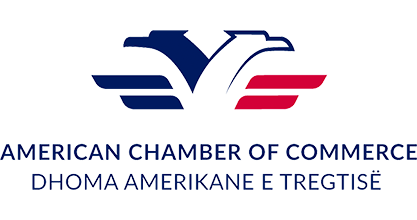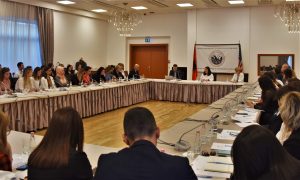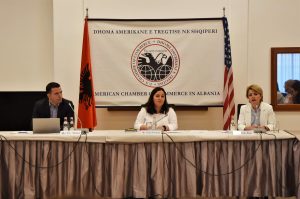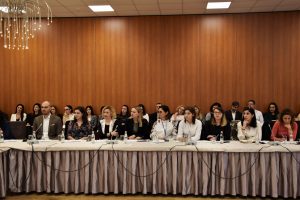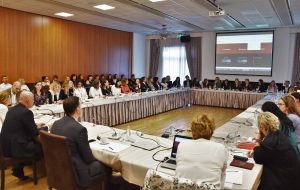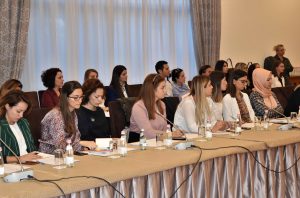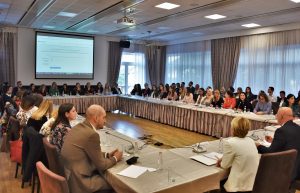AmCham members focus on Employment Law and inspections
AmCham’s Labor and Ethics Committee invited Deputy Finance and Economy Minister Dajna Sorensen and Chief Labor Inspector Arben Seferaj to a joint meeting with AmCham members to discuss issues arising from the implementation of the Labor Code and the Law on Employment and the effect on business-labor administration relations during inspections.
Labor and Ethics Committee Member Rolanda Duro briefly explained the issues members had requested to be discussed at the meeting with the two high officials, many of which related to the Employment Law and the changes it underwent in 2019.
The reintroduction of the social fund concept means it will not only be limited to people with disabilities but also extended to include all vulnerable groups. That’s one of the changes applied at the Employment Law. This non-budgetary fund will always be available to enable vocational training and assistance for this group of workers. The Ministry of Finance and Economy is expected to issue an instruction soon that would help govern the relationship.
Another important change in the law is the creation of a new agency that will focus on two pillars — vocational training and employment with the primary goal of improving the employment relationship between businesses and employees. New jobs and new job profiles to guide workers are other new elements brought by the Employment Law changes and these will be managed by the Ministry of Economy and Finance in cooperation with the new Employment Agency.
There has been great interest among representatives of HR departments to know the technicalities of how employees with disabilities will be selected and what the ways through which they will be professionally trained for the workplace. The law also provides for a contribution as high as the minimum wage for those companies that cannot hire members of this group due to their job profile. It is this element of contributions from companies that cannot hire employees from the social fund that received the attention of AmCham members who sought more information on the technicalities of the needed payment. The way it will be paid, the time it takes effect and what makes the payment mandatory were all questions raised by members. Speaking about the law’s application, Ms. Sorensen explained to business representatives at the meeting that the law would come into force in April 2020 and currently authorities are working to issue instructions to make all procedures very clear.
AmCham members discussed the possibility of setting up a working group that includes business representatives to enable the drafting of guidelines that not only facilitate implementation but also consider the issues the business goes through when implementing the new legal obligations.
While the Ministry of Finance and Economy is responsible for drafting legislation on employment development programs, the State Labor Inspectorate is in charge of their implementation. Speaking about the law enforcement aspect, Chief Inspector Seferaj explained to all AmCham members present at the meeting that the inspectorate web portal contains all the necessary explanations on inspections as well as the legal provisions and the rules under which an inspection is organized.
How inspections are performed
The new platform tries to make every part of the inspection transparent and guides businesses on everything they need to consider during an audit. Inspectorate experts explain that the most common type of audit is the one that goes through asking for preliminary information, which gives the business time to prepare and have all the necessary information. But that does not deprive an inspector who, based on his risk analysis, can also make a surprise inspection at the premises of the company. “That right is given to the inspector by law, and this cannot be an opposing argument from businesses,” Labor Inspectorate experts noted.
Regarding the legitimacy of inspections and increasing transparency, Chief Inspector Seferaj stated that the aim is to ensure the implementation of the law and not to penalize businesses. “There is no associated penalty in the first inspection, regardless of the deficiencies we can find. Inspections are not a stick we have turned against businesses, on the contrary, we have turned it over to the inspectors to minimize any abuse and corruption” Mr. Seferaj said.
Inspections at company branches in the districts
AmCham members noted at the meeting that officials should consider performing inspections at company headquarters rather than the branches in the districts as a good portion of the needed documents are actually in the main offices. Blerina Krantja of NOA Company provided examples of inspections carried out at its satellite district branches while headquarters did not have any information that these were taking place, and furthermore were given no time to allow it to submit the necessary documentation on the inspection. But ministry experts explained that the law allows inspectors to perform an audit on company branches in the districts since three of the documents that are checked during these inspections must, as a legal obligation, be available in every branch.
“We have the right to request any branch wherever it may be located to provide a risk assessment document, a statement of accidents and a list of dangerous materials,” said the inspectorate expert.
How annual leave should be handled under the new law
The meeting with the Chief Labor Inspector also dealt with the issue of how many days of annual leave should employees receive. A significant portion of the members present at the meeting had concerns as the law specifies that the employer must give the employee at least 7 working days of annual leave at a time. But on the other hand, the employee does not have this obligation under the law and may require two or three days’ leave from his or her leave for his or her own needs.
This is considered a mistake by the Labor Inspectorate’s controls and the business is seeking to consider a minimum two-day permit. Experts of the Labor Inspectorate explained that this issue was constantly raised by businesses and they requested an opinion from the lawyers who drafted the Labor Code and were required to apply the law as expressed in the seven-day time limit.
There have been a lot of questions and discussions from HR staff and lawyers from AmCham member companies on this issue. Their insistence was motivated by the fact that the Labor Code specifies that it is the employer who is required to grant a seven-day leave while the employee’s requirement is not specified in the law. This means that he/she has the right to apply for two or three days off at a time. This much-discussed issue remains one of the topics on which the AmCham Labor Committee will work closely with lawmaking and law enforcement institutions.
